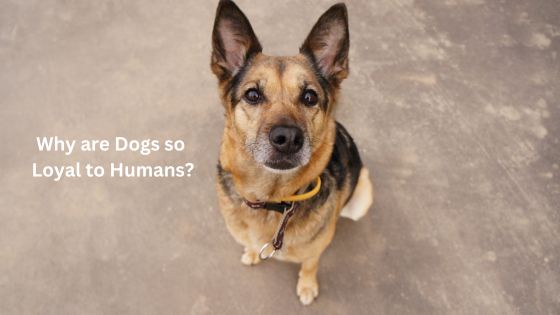Dogs are always man's best friend. This loyalty goes beyond mere companionship; it's a profound emotional connection that has puzzled scientists and dog enthusiasts alike. In this article, we will explore the fascinating reasons behind dogs' loyalty to humans, as backed by scientific research.
Bonding with Humans
Through the process of domestication, dogs developed social skills. They also become more emotional. Dogs can form strong bonds with their human companions. This loyalty was essential for their survival in a cooperative setting.
Oxytocin and Human-Dog Bonding
The interactions between humans and dogs trigger a release of oxytocin in both. This hormonal response reinforces the emotional connection. Oxytocin also strengthens loyalty in humans and dogs.
Trust and Communication
Dogs' Ability to Read Humans
Dogs have an exceptional ability to understand human body language, facial expressions, and vocal cues. This understanding builds trust and enhances their loyalty towards humans.
Importance of Trust in Loyalty
Trust is a fundamental element of loyalty. Dogs' ability to trust their human companions fosters a deep sense of loyalty that transcends ordinary pet-owner relationships.
Emotional Intelligence in Dogs
Dogs' Empathy Towards Humans
Studies have demonstrated that dogs show empathy towards humans in distress. They can sense their owners' emotions and respond with comfort and support.
How Emotional Intelligence Strengthens Loyalty
The emotional intelligence displayed by dogs plays a significant role in strengthening the bond of loyalty. The ability to empathize fosters a profound connection between humans and their canine friends.
Loyalty vs. Pack Instincts
Loyalty to Humans as Part of Pack Behavior
In the wild, wolves and wild dogs exhibit loyalty within their packs. Domesticated dogs extend this pack mentality to their human families, considering them as part of their pack.
How Human Interaction Impacts Loyalty
Positive interactions and care from humans reinforce dogs' loyalty. They perceive humans as important members of their pack, leading to heightened loyalty.
The Influence of Upbringing and Training
Positive Reinforcement
Positive reinforcement-based training methods contribute to dogs' loyalty. When treated with kindness and reward, dogs develop a stronger bond with their owners.
Impact of Mistreatment on Loyalty
You may have heard people saying we got a dog and I hate it. This happens when you are mistreating your pet. Mistreatment or neglect can negatively impact a dog's loyalty. Dogs subjected to cruelty may exhibit behavioral issues and a lack of trust towards humans.
Loyalty in Comparison to Other Pets
Loyalty in Cats and Other Animals
Dogs are mainly known for their loyalty. Few other pets like cats can also form strong bonds with their owners. The way of showing love can be different from dogs.
Factors Influencing Loyalty in Different Species
The loyalty displayed by various animals is influenced by their evolutionary history, social structures, and interactions with humans.
Loyalty's Impact on Human Well-being
Health Benefits of Having a Loyal Dog
Dog devotion has been associated with various positive effects on human health, including lowered blood pressure, lowered stress levels, and enhanced mental health.
Emotional Support and Companionship
Dogs' loyalty provides emotional support and companionship, especially in times of loneliness or emotional distress.
Dogs' Loyalty and Human Psychology
Attachment Theory
The concept of attachment theory helps explain the deep emotional bonds between humans and their loyal canine companions.
Reciprocal Bonds with Dogs
Humans often reciprocate dogs' loyalty with their own affection and care, further reinforcing the bond.
The Loyalty-Training Connection
Strengthening Loyalty Through Training
Training sessions not only teach dogs essential skills but also enhance the trust and loyalty between dogs and their owners.
Loyalty as a Reward System
For dogs, loyalty can be seen as a reward-based system where their loyalty is reciprocated with love, attention, and care.
Also Read Why Do Dogs Pick a Favorite Person?
FAQs
- Are all dogs naturally loyal to humans?
While dogs are known for their loyalty, individual differences exist based on their breed, upbringing, and experiences.
- Can a dog's loyalty change over time?
Yes, a dog's loyalty can be influenced by how they are treated and the quality of their interactions with their human companions.
- Do dogs feel sadness when separated from their owners?
Dogs can experience separation anxiety when separated from their owners for extended periods, displaying signs of distress.
- Can you build loyalty with an adopted or rescued dog?
Yes, with patience, love, and consistent positive reinforcement, adopted or rescued dogs can develop strong bonds of loyalty with their new owners.
- Can dogs be loyal to more than one person?
Dogs have the capacity to form strong bonds with multiple family members or caregivers, displaying loyalty to each of them.
Conclusion
The loyalty displayed by dogs towards humans is a remarkable and heartwarming phenomenon. Scientific evidence supports the idea that this loyalty is rooted in evolutionary history, trust, communication, and emotional intelligence. The bond between humans and dogs goes beyond companionship, enriching the lives of both species in profound ways.


No comments yet